- Home
- Mike Lupica
Hot Hand Page 2
Hot Hand Read online
Page 2
And the madder he got, the madder Billy started to get at him for being mad.
With four minutes left in the game and one of the guys on the Mavericks shooting two free throws, Lenny whispered to Billy, “What’s the deal? You just figure out how steamed you are at him?”
“I’m not,” Billy said.
“You sure?” Lenny said.
The next time down the court, Billy came down on a fast break, pulled up and shot from way outside, even though Lenny was wide open, cutting for the basket. The shot missed, but that wasn’t what upset his dad.
His dad stood up, yelled at the ref for a time-out, jerked his thumb over his shoulder like he was an umpire throwing a manager out of a baseball game and said to Billy, “Take a seat.”
“But I haven’t played half the game.” It was the only thing Billy could think of to say.
“The way you’ve been playing the last few minutes,” his dad said in a loud voice, “you’re lucky I left you in this long.”
Billy stood where he was, still a few feet on the court, feeling everybody else in the game and the crowd staring at him, like he was out in the open in paintball.
“We’re waiting,” his dad said.
Billy looked over at Lenny, standing in front of their bench, Lenny somehow begging just with his eyes for Billy to get off the court, not make things worse than they already were.
Finally Billy went and sat down as far away from where his dad sat as he could.
Yet when the game started back up, his dad wouldn’t drop it. His face was red as he yelled down to Billy, “When you’re ready to be part of the group again, you can go back in.”
The next thing just came out of Billy, like a button popping off a shirt, even though it was like he was saying it to the floor, his head down.
“What do you know about being part of the group?” he said.
His dad ran to Billy at superhero speed, standing over him, not seeming to care who could hear what they were saying to each other.
“What is that supposed to mean?”
“Nothing,” Billy said.
“It didn’t sound like nothing to me,” his dad said. Still not letting this go. “If you’ve got something you want to say to me, go ahead and say it,” Joe Raynor said.
For one quick second, Billy felt that burn you get inside your eyes when you think you might start crying, but he put his head down so nobody could see him, squeezed his eyes shut until the feeling went away.
When he was positive he wasn’t going to cry, he looked up at his dad. Usually when he was in trouble about something, his dad would have to order Billy to look him in the eyes.
Not today.
“I guess I just need to know something,” Billy said. “Are you my coach today or my dad?”
FOUR
They were back at Billy’s house in the late afternoon, shooting baskets in the driveway after playing 2006 FIFA World Cup on Xbox 360 for a couple of hours at Lenny’s.
It was still the middle of winter and pretty cold, even with the sun out, but Billy and Lenny didn’t care how cold it was. There were times when they came out here and shot around even when it was snowing.
Lenny was like a friend and an older brother all at the same time. Lenny’s brother was a lot older than they were, already a sophomore in college. So it worked out great, almost like they’d planned it this way. Billy was like the younger brother Lenny didn’t have. Lenny? He was like the older brother Billy sort of wished he had—more than an older sister from Mars.
Billy loved Ben, who in that quiet way of his was one of the coolest people he knew.
He just had more in common with Lenny.
And more fun.
Lenny was saying now, “I didn’t know whether your dad was going to ground you for life or just make you run laps forever.”
Billy, even with his hands starting to get a little colder now, made another shot from the outside and motioned for Lenny to pass him the ball back.
“Don’t worry,” Billy said. “I’m not letting him mess up my whole day.”
“Just don’t let it mess up your whole season,” Lenny said. “You know you wait all year for basketball, just like I do.”
“I won’t, don’t worry,” Billy said. “We made a deal, remember?”
“Deal?” Lenny said. “You did everything except make me take one of those blood oaths.”
Their deal, one they never even talked about with the other guys on the team, was that they were not just going to win the championship of their age division, they were going to go undefeated.
Billy made another one from outside their three-point line, the one they’d drawn in chalk, the ball hitting nothing but net. The swish sound of the ball going through the net reminded him of a big gust of wind.
“Least I can still shoot,” Billy said. “Even if somebody acts like I’m the biggest gunner in the world.”
“You and your dad just had a bad day,” Lenny said.
Like every other day this week, Billy thought.
“You played good the last couple of minutes after he let you back in,” Lenny said.
“He must’ve told you that afterward,” Billy said, “because he sure didn’t tell me.”
“Trust me,” Lenny said.
“How do you know?”
“I know things,” Lenny said. Then in one of his deep voices, like the cartoon voice of Batman, he said, “Deep and mysterious things.”
Lenny knocked the ball out of Billy’s hands, dribbled in, made a reverse layup with his left hand, made that look as easy as eating ice cream.
“And now,” Lenny said, “I am going to give you such a good beatdown in one-on-one that you’re going to want to take yourself out of the game.”
“In your dreams,” Billy said.
“Shoot for it,” Lenny said, flipping him the ball.
“Play till ten baskets?”
“Till dark!” Lenny said.
“If we play winners, it might take you that long just to get on offense,” Billy said.
“In your dreams,” Lenny said.
Billy stepped to their chalk free throw line, drained another shot. “My ball,” he said, then handed it to Lenny and said, “Check.”
They played one-on-one in Billy’s driveway then, played till dark, going after each other the way they always did, shoving and laughing and trash-talking. They hooped it up as hard as they could, so wrapped up in basketball and playing against each other that neither one of them noticed Ben Raynor watching them from his bedroom window, watching them the whole time.
Crying.
FIVE
Once his mom came back from Boston, things started to feel normal.
Not great. Definitely not great.
Just more normal.
It was like a math problem, Billy would think sometimes. The family they used to have, minus one.
One night, after an extra Magic practice, his dad picked up him and Eliza and Ben and took them out for burgers, saying they were going to start doing this at least once a week. Eliza talked even more than she usually did, which was saying something. Even on a slow day she talked so much Billy would stare at her sometimes like she was a science project, waiting to see if she ever actually took a breath.
Sometimes Billy thought that Ben not talking very much made Eliza think that meant more time for her.
Like it was her job to pick up the slack even more.
The weird part of that night came after dinner, when their dad dropped them off at the house without even coming inside.
“Tell your mom I’ll give her a call tomorrow, maybe set something up for the weekend,” Joe Raynor said before they got out of the car.
Billy wanted to tell him to come inside and tell her himself—she was just on the other side of the front door—but he didn’t.
“Love you guys,” his dad said, and Eliza said “love you, too” for all of them. They walked up the front walk and through the door themselves, Ben coming in last, watching the
car until it disappeared around the corner.
Eliza went straight upstairs and in less than a minute, Billy could hear her talking away on her cell phone, probably getting ready to instant-message all her other friends.
“Feel like watching a game with me?” Billy said to Ben.
But Ben shook his head and said he was going to finish watching a movie on his computer, then went upstairs to his own room and shut the door, the way he had pretty much every single night since their dad had left.
Billy poked his head into the dining room, where his mom was working away at her computer, papers spread out all around her on the dining room table.
“Hey,” he said.
“Hey, pal, how’d it go?”
“Fine.”
“Did your brother eat?”
“Half his burger.”
His mom said, “Better than nothing.” Then she said, “I’m almost done here.” Billy said it was all good, there was a game he wanted to watch.
“When isn’t there?” she said, and went back to work.
Billy went into the den, turned on the TV, found the Suns-Cavaliers. It had just started, which meant he could probably watch the whole first half before bed. The first commercial, he snuck into the kitchen and grabbed a bag of Doritos and a small bottle of Gatorade, even though it was way past what his mom called “the junk-food deadline.” Then he came back and watched Lenny’s man, LeBron, do things with the basketball the announcers said only Michael Jordan had ever done at the same age.
That always annoyed Billy’s dad, every time they did that during a Cavs game, because he’d point out that kids like Billy had never even seen Michael Jordan play.
This had always been the time of night, the last hour before bed, when Billy and his dad would sit on the couch together in this room and watch games together. His dad would do a better job announcing the game than the real announcers did.
But not tonight.
His dad wasn’t there.
Billy had started playing in the Rec League when he was seven. So this was his fourth year playing for his dad, who was the only coach he’d ever had.
Lenny’s dad was the assistant coach this year, but he’d only signed on so that Billy and Lenny could play on the same team. Under the rules of the Y, you could play on the team that your dad coached, and each team could have two coaches.
Some dads only coached together so they could put two star players together—it didn’t matter to them whether the kids were friends or not. But Joe Raynor and Pete DiNardo had known each other since they were kids, and Billy and Lenny were best buds, so the whole thing worked out great for everybody, especially Mr. DiNardo, who only had to come to the games and watch from the bench.
The Magic was Joe Raynor’s team, the best one he’d had since he’d started coaching Billy, the best one by far. And he’d made it clear since their very first practice, from the first Wednesday night in the gym at West School, that they were all supposed to have one goal: Win the league championship.
It was something he and Billy had never done together.
They had lost twice in the semifinals, twice in the finals. Last year they were down one point with five seconds left when Billy had gotten fouled and sent to the free throw line to shoot two free throws.
If Billy had made both, his team—known as the Blue Devils last year—would have been ahead by a point and probably would have won the game and the championship of the eight- and nine-year-old division.
He missed them both.
The first one he shot way too hard, even as he heard his dad yelling at him to relax from the bench. It bounced off the backboard and didn’t even hit the rim.
He still had one to tie.
Billy bounced the ball five times like he always did, because his dad had taught him to always follow a routine when you shot free throws. He took a deep breath and shot the second one much better, got that good feeling you get when you think you’ve put just the right spin on the ball.
But it was a little too long. The ball caught the back of the rim and then hit the front of the rim and hung there, like it couldn’t decide whether it wanted the game to be tied or not, like it was deciding whether the Blue Devils or the Huskies should win the championship.
It decided on the Huskies.
Billy stared at the rim afterward and felt worse than he ever had about sports, felt the kind of sad that you felt on the last day of summer vacation.
Billy had never forgotten that day, not just because he missed both free throws, but because of the way his dad took the loss, even though he told Billy and everybody else on the Blue Devils how proud he was of them afterward.
He’d told Billy the same thing all the way home, how proud he was of him, how the Blue Devils wouldn’t even have been in a position to win the game if Billy hadn’t shot the lights out of the basket all day.
But when they did get home, his father had gone into his study, what he called his trophy room—“We’re going to add one more to the collection today,” he’d said before they left to play the Huskies—and closed the door. He spent the rest of the day behind that closed door, alone.
Now this season, as the Magic had won their first six games, he kept talking to Billy about “unfinished business.”
Billy wanted to win the championship this year as much as anybody. More than anything, he wanted to somehow get the chance to make the two free throws he’d missed last year.
It was just that he’d never thought of basketball as any kind of business.
After the Magic won their next game, making it 7-0 for the season, Billy’s dad still said he was shooting too much, told him on the way home—Billy’s home, not his dad’s anymore—that the Magic should have won more easily than they did.
Billy just kept agreeing with him, nodding sometimes, saying “yes, dad” sometimes, saying he would keep working on his passing, that he’d do better next week.
Not because he believed what he was saying or actually did think he’d shot too much today. Just because he didn’t want this to be another day when he got out of the car feeling like they’d lost instead of won.
“I know I ask a lot of you,” his dad said.
You’re not kidding, Billy thought.
“I’m asking you to be a big guy in basketball the same way I want you to do that with your brother,” his dad said.
“Ben’s fine,” Billy said. “I think he’s just getting himself ready for his big recital.”
Billy didn’t know when Ben’s recital was exactly, just that it was around the time the basketball season ended. Ben had said something one time about how they were both going to be in the play-offs at the same time, just in different things.
“You two ever talk about your mom and me?”
“No.”
“I don’t talk with him the way I talk with you,” his dad said. “But he’s good?”
“Dad, he’s Ben, okay? You know what Mom thinks about him playing the piano. He lets the piano talk for him.”
“I wish sometimes you worked as hard at basketball as Ben does at piano.”
They were in front of the house now, the car shut off. That wasn’t good.
It meant they weren’t done.
“I do work,” Billy said. “You see me . . . or used to see me . . . in the driveway.”
“I’m talking about working at being a team player.” The car wasn’t going anywhere, but Billy saw him still gripping the wheel with both hands, hard. “There were a bunch of times today when it should have been pass first with you. But it’s always pass last. As in last resort.”
Billy felt himself biting his lower lip to keep himself from getting mad. It seemed like it hardly took anything these days for that to happen. Or for his dad to get mad at him.
“That’s not true.”
“Yes, it is,” his dad said. “And I can’t let you get away with it. If the coach’s son is playing by his own rules, the other guys don’t respect him, and they don’t respect the coach.”
Billy said, “The guys on the team like playing with me.”
“You sure about that?”
“You sure they like playing for you?” Billy said.
Sometimes keeping things inside was harder than saying them.
“This isn’t about me!” his dad said, his voice sounding so loud in the front seat it was like he’d turned on the radio all of a sudden. Turned it on and turned it up. “This is about being a team, which means everybody being a team player. Starting with you.”
“How bad can we be at being team players if we haven’t lost a game yet?” Billy said.
“Trust me,” his dad said, “we’re going to if you don’t get with the program.”
Billy opened the door on his side now. “I didn’t know it was a program,” Billy said. “I thought it was just a game.”
He ran for the house, ran as fast as he could, like he was in a game of tag and the house was safe.
SIX
When the weather was warm enough, even in the winter, recess at West School was outside, in the period right before lunch. They were outside now on Tuesday morning because it felt like a spring day, even though spring was still more than a few weeks away.
Everybody wanted to go outside even when it was colder than Ice Age. When you were in school, you were always looking to get outside, even if it was just for a fire drill.
Billy was in fifth grade at West, Ben was in fourth. Lenny was in sixth, his last year at West before middle school at Hayground. That’s the way it worked in their town, you moved up in seventh grade.
They all had the same recess. Billy and Lenny and their friends had been playing four-square for a while, with lots of stops and starts, mostly because Lenny had rules for four-square that only he could understand.
When they finished, Billy said to Lenny, “Do you think I shoot too much?”
Lenny grinned. “It’s pretty much the object of the game in four-square, dude. Keep serving it up.”
“You know what I mean.”
“Hey,” Lenny said. “Everybody in basketball shoots too much sometimes.”
“Do you think I shoot a lot too much?”
“Nah,” he said. “You only do that when you’re feelin’ it. And when you’re feelin’ it in hoops, it’s like a rule that you gotta keep puttin’ it up.”

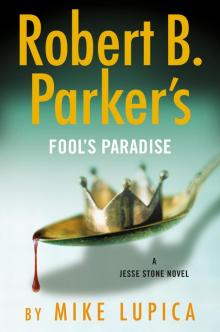 Fool's Paradise
Fool's Paradise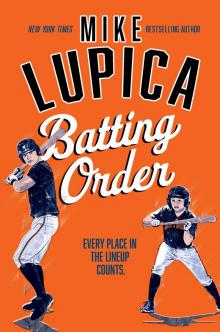 Batting Order
Batting Order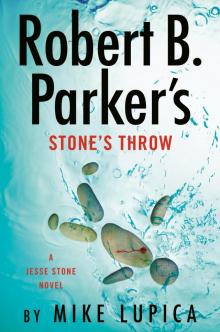 Stone's Throw
Stone's Throw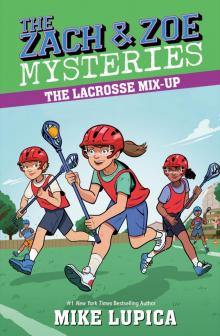 The Lacrosse Mix-Up
The Lacrosse Mix-Up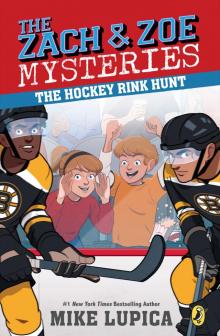 The Hockey Rink Hunt
The Hockey Rink Hunt Payback
Payback Triple Threat
Triple Threat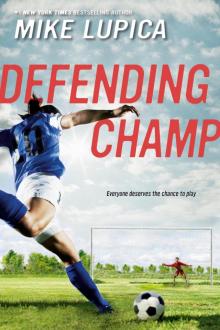 Defending Champ
Defending Champ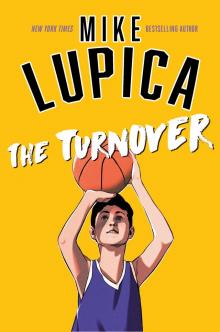 The Turnover
The Turnover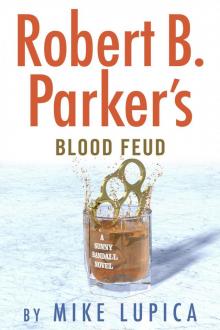 Robert B. Parker's Blood Feud
Robert B. Parker's Blood Feud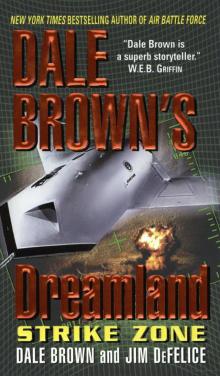 Strike Zone
Strike Zone Hero
Hero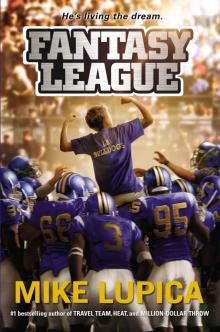 Fantasy League
Fantasy League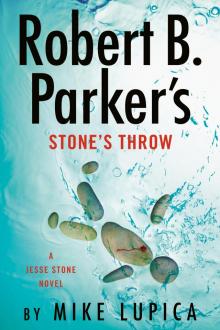 Robert B. Parker's Stone's Throw
Robert B. Parker's Stone's Throw The Big Field
The Big Field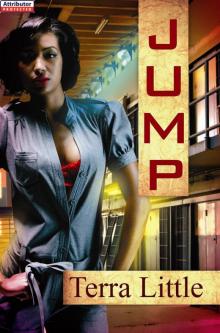 Jump
Jump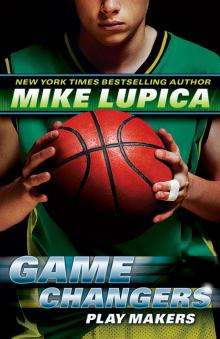 Play Makers
Play Makers The Underdogs
The Underdogs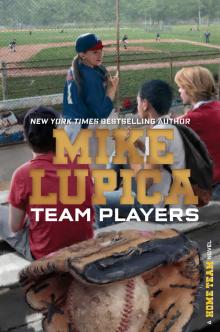 Team Players
Team Players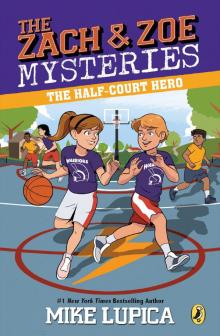 The Half-Court Hero
The Half-Court Hero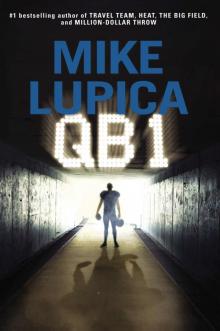 QB 1
QB 1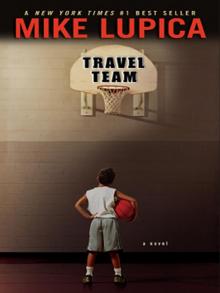 Travel Team
Travel Team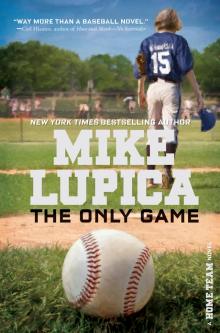 The Only Game
The Only Game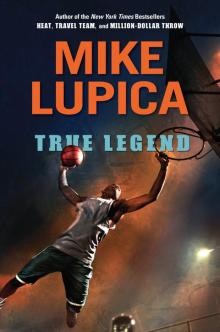 True Legend
True Legend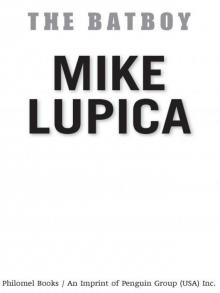 The Batboy
The Batboy Hot Hand
Hot Hand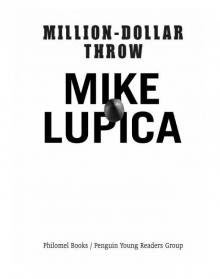 Million-Dollar Throw
Million-Dollar Throw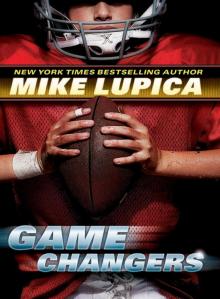 Game Changers
Game Changers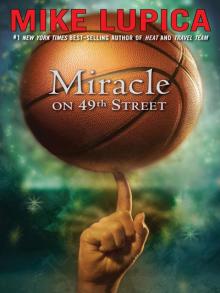 Miracle on 49th Street
Miracle on 49th Street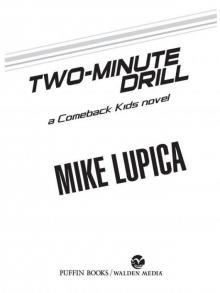 Two-Minute Drill
Two-Minute Drill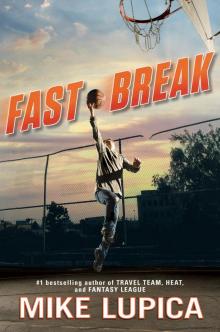 Fast Break
Fast Break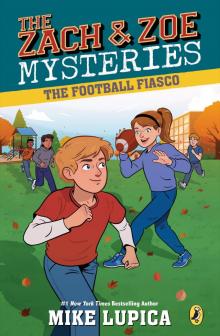 The Football Fiasco
The Football Fiasco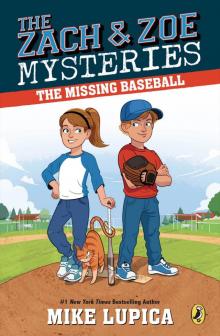 The Missing Baseball
The Missing Baseball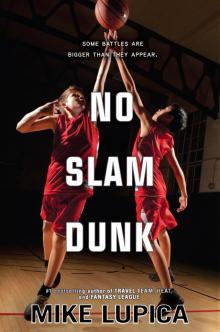 No Slam Dunk
No Slam Dunk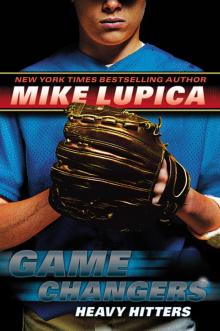 Heavy Hitters
Heavy Hitters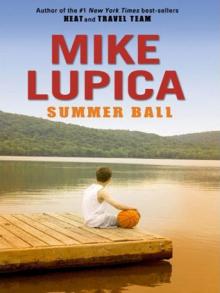 Summer Ball
Summer Ball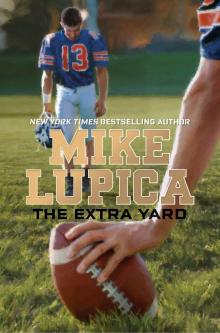 The Extra Yard
The Extra Yard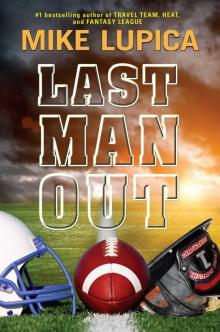 Last Man Out
Last Man Out